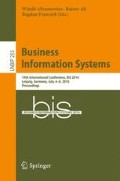Abstract
Multiagent (MA) organizations can be regarded as a functional part in business information systems, in which software agents negotiate conditions for participation in the organization. How the strategic behavior of self-interested agents and MA-Organizations affects the formation process, however, is still not known. This research is concerned with the specification of MA-Organizations in business information systems and the design of negotiation protocols for determining the agents participation conditions. We draw on mechanism design to model the participation decision of the agent and the organization as a bilateral trading game. In a simulation experiment we find that a rather simple manipulation scheme provides a suitable approximation for the equilibrium strategies employed by the agents.
Access this chapter
Tax calculation will be finalised at checkout
Purchases are for personal use only
References
Jennings, N.: On agent-based software engineering. Artif. Intell. 117, 277–296 (2000)
Horling, B., Lesser, V.: A survey of multiagent organizational paradigms. Knowl. Eng. Rev. 19(4), 281–316 (2004)
Picot, A.: Organisation. Schäffer-Poeschel Verlag, Stuttgart (2005)
Sandholm, T., Lesser, V.: Coalitions among computationally bounded agents. Artif. Intell. 94, 99–137 (1997)
Kahan, J.P., Rapoport, A.: Theories of Coalition Formation. L. Erlbaum Associates, London (1984)
Shehory, O., Kraus, S.: Methods for task allocation via agent coalition formation. Artif. Intell. 101(1–2), 165–200 (1998)
Wooldridge, M., Jennings, N.R., Kinny, D.: The Gaia methodology for agent-oriented analysis and design. Auton. Agent. Multi-Agent Syst. 3(3), 285–312 (2000)
Bulling, N.: A survey of multi-agent decision making. Künstliche Intelligenz 28, 147–158 (2014)
Chatterjee, K., Samuelson, W.: Bargaining under incomplete information. Oper. Res. 31(5), 835–851 (1983)
Premm, M., Widmer, T., Karänke, P.: Bid-price control for the formation of multiagent organisations. In: Klusch, M., Thimm, M., Paprzycki, M. (eds.) MATES 2013. LNCS, vol. 8076, pp. 138–151. Springer, Heidelberg (2013)
Widmer, T., Premm, M., Karaenke, P.: Sourcing strategies for energy-efficient virtual organisations in cloud computing. In: Proceedings of the 15th IEEE Conference on Business Informatics (CBI 2013) (2013)
Myerson, R.B., Satterthwaite, M.A.: Efficient mechanisms for bilateral trading. J. Econ. Theor. 29, 256–281 (1983)
Russell, S.J., Norvig, P.: Artificial Intelligence: A Modern Approach, 2nd edn. Prentice Hall, Upper Saddle River (2003)
Ferber, J., Gutknecht, O.: A meta-model for the analysis and design of organizations in multiagent systems. In: Proceedings of the Third International Conference on Multi-agent Sytstems (ICMAS 1998) (1998)
Bond, A.H., Gasser, L. (eds.): Readings in Distributed Artificial Intelligence. Morgan Kaufmann Publishers, San Mateo (1988)
Thom, N.: Stelle, Stellenbildung und -besetzung. In: Frese, E. (ed.) Handwörterbuch der Organisation, 3rd edn, pp. 2321–2333. C.E. Poeschel Verlag, Stuttgart (1992)
Hill, W., Fehlbaum, R., Ulrich, P.: Organisationslehre, 5th edn. Paul Haupt, Berlin (1994)
Che, Y.K.: Design competition through multidimensional auctions. RAND J. Econ. 24, 668–680 (1993)
Satterthwaite, M.A., Williams, S.R.: Bilateral trade with the sealed bid k-double auction: existence and efficiency. Econ. Theor. 48(1), 107–133 (1989)
de la Hoz, E., López-Carmona, M.A., Marsá-Maestre, I.: Trends in multiagent negotiation: from bilateral bargaining to consensus policies. In: Ossowski, S. (ed.) Agreement Technologies. Springer, Dordrecht (2012)
Kelso, A., Crawford, V.P.: Job matching, coalition formation, and gross substitutes. Econometrica 50(6), 1483–1504 (1982)
Acknowledgments
This work has been supported by the project InnOPlan, funded by the German Federal Ministry for Economic Affairs and Energy (BMWi, FKZ 01MD15002).
Author information
Authors and Affiliations
Corresponding author
Editor information
Editors and Affiliations
Rights and permissions
Copyright information
© 2016 Springer International Publishing Switzerland
About this paper
Cite this paper
Widmer, T., Premm, M., Kirn, S. (2016). A Formalization of Multiagent Organizations in Business Information Systems. In: Abramowicz, W., Alt, R., Franczyk, B. (eds) Business Information Systems. BIS 2016. Lecture Notes in Business Information Processing, vol 255. Springer, Cham. https://doi.org/10.1007/978-3-319-39426-8_21
Download citation
DOI: https://doi.org/10.1007/978-3-319-39426-8_21
Published:
Publisher Name: Springer, Cham
Print ISBN: 978-3-319-39425-1
Online ISBN: 978-3-319-39426-8
eBook Packages: Business and ManagementBusiness and Management (R0)

